Arnout Bloys van Treslong believed that a career in surgery was his future, but a change of heart had him place a scalpel down.
He chose business instead - it was more appealing. In 1999, the Dutch began to work for the ING Group, a Dutch banking and financial institution. Over the years, he’s danced through different ING jobs that landed at his feet. Last year, the Dutch became the CEO of ING Hubs Slovakia, a service centre with more than a thousand employees providing banking services.
Bloys van Treslong, who travels between Amsterdam and the Slovak capital on a weekly basis, knows what his job is to transform the service centre into a hub of experts: support people’s self-development to attract more complex roles to the centre in the Bratislava borough of Ružinov.
“I think it will become more and more interesting for talents within Slovakia or talents that want to return to Slovakia to work in the service centres,” he predicts in an interview with The Slovak Spectator.
In the meantime, he explores Bratislava restaurants and Slovakia.
How a Dutch surgeon joined the world of business
To me, Dutch surnames sound very noble. When I typed your name into a search engine, Johan Arnold Bloys van Treslong popped up. He was a naval officer in the 18th century. Were your ancestors sailors?
There’s a whole naval history in my family. A lot of admirals and people who worked at the Navy. It started, I think, in 1572 when one of my ancestors, a captain, conquered the first city back from Spanish rulers at the time.
You’ve also sailed through different ING jobs over the years, so to speak. How long have you been working for the ING Group?
It’s been a long time indeed. Since 1999. So, I’ve been with the company for 25 years but I worked with a lot of different parts of the company.
Had you also worked for the firm in other countries before becoming ING Hubs Slovakia CEO?
No, not that much. As a trainee, I worked in Romania for a while. Otherwise, I worked in the Netherlands because I had small kids and I really wanted to be able to spend time with them. But my kids have grown up and now, I can be in Bratislava. I became internationally mobile, as we call it within the ING.
What convinced you to join the ING group back in the late nineties?
Well, it was the start of the internet hype. And at that point, ING was very innovative. All banks were confused at that time, but I saw ING really acting. ING started a web provider, a telecom provider. Vodafone in the Netherlands, for example, used to be ING’s business unit, and that was appealing to me. So I thought: “Okay, this is where a lot of changes are going to happen.” And I believed that the ING was a firm that would adapt to the circumstances. That’s what I appreciated at that time.
Did you also study business in university?
I tried a little bit of entrepreneurship during my university studies when I had my own catering company, and that was a very appealing experience to me.
But I studied medicine, and I wanted to become a surgeon. I did a lot of orthopaedic surgery as an assistant during my studies. But then, I realised at the age of 25 that I was really scared of knowing what I would be doing when I turned 65. As a doctor you’re just in that one line for the rest of your life, and that wasn’t fitting my profile. But I completed my studies, worked in the emergency room for four years, and in the end, I decided it was going to be business life for me.
You’ve never regretted your decision not to pursue medicine for life?
No, I never did. But I’ve never ruled out that I might return to working in health care at some point. I know it is one of the big challenges in our society.
So you’re still interested in medicine?
Yes, I sometimes read articles about surgeries. I have interesting discussions with friends who I studied medicine with. I really appreciate what they do, but it is a bit of a repetitive job. So, you know, I think I made the right choice.
What it’s like to work for ING
I assume your jobs at ING haven’t been repetitive.
Not at all. There are different things that come towards me every day.
I’ve held lots of different roles within the ING. Although it still says ING on a business card, the firm has moved from asset management to private banking, investments, call centres, from retail banking to wholesale banking. There’s been a lot of variety.
When did you get the offer to head the Bratislava office?
They asked me if I would be interested in this role at Christmas [2022].
Why do you think they chose you for the job?
I think I’ve done a lot of different things within the ING, from marketing, product management to being a tribe lead [A title used within ING - Ed. note]. I’ve run big operational teams, call centres in the Netherlands and Belgium. From this perspective, I bring some experience to the team in Bratislava, which has been growing pretty fast and steadily over the last years.I think we’re extremely strong on the ‘people’ side. The culture is something that I’m very proud of. And now, I’m trying to work together with the team on how we can become more proactive, uh, more business focused as well.
Apart from being the CEO, what has been your best work experience at ING?
Of course, your current job is your best one. I really enjoy this job although I only started seven months ago.
But what I really enjoyed was the start of agile transformation eight or so years ago when tech was having a big impact on the banking sector. ING in the Netherlands took a step forward by organising us radically differently. Tech and operations, marketeers and product managers were all put into multi skilled teams managed by tribe leaders. It was a very flat organisation, trying to use the best out of all startups and applying it into the corporate. That startup period was amazing. The only company that was helping us out was Spotify. We were being innovative and there was nobody else who could tell us how to do it. It was very much a team effort, we had such little time that we were forced to trust each other. And I’ve never experienced such proximity afterwards, although I still try to get that same kind of trust in all the teams that I work with.
After the Netherlands, agile transformation spread out throughout the company to other countries, and everybody added their own twist depending on the local circumstances.
What does agility mean for ING?
For ING, it means empowering teams. There’s a lot of self steering by teams. Each circle, made up from different teams, has about 20 people. We don’t have team managers. Instead, we have circle leads. All these people themselves organise the work of circles and work on themselves, too. Circle leads then report to super circle leads, who are part of my team.
There always must be somebody - a serving manager - who coordinates people and sets some boundaries and goals. Otherwise, it would just go anywhere.
It’s like playing football, you know, there’s one goal that will give you points and the other goal will give you no points. You have to have some rules. And within those rules on that pitch, it’s up to you and your team how you optimise and get the best outcome.
How many people work at ING Hubs Slovakia today?
Between 1,300 and 1,400.
Are most of them Slovak?
There are many nationalities.I think it’s over 20 different nationalities. For example, there are people from Ukraine, Czechia, the Philippines, the Netherlands, and Slovakia.
We see that a lot of people have work experience either with other companies in Bratislava or they studied or worked abroad and decided to return to Slovakia.
Based on your experience, how similar are Slovak and Dutch employees?
I think there are some commonalities. We say what we mean. People working here are okay in speaking up and they feel comfortable to share their ideas and their feedback. They say, “Please, stop doing this!” quite openly, for example. I think they’re a little bit more introverted than maybe we are in the Netherlands sometimes. So I invite people to speak up and be proactive in all kinds of settings that we have. But I think we match pretty well.
After you became the CEO, how has your life changed?
I think you’re always as good as your own team is. So having a team that you can trust and rely on is critical for me.
When I was considering starting here, I visited Bratislava to see if we could do business here and to meet the team. After that I really was convinced that this would be a good move for me, and that I also had something to contribute. I was impressed by people’s sharpness and the level of people’s development here, how good we are in providing opportunities for people to grow. I think that’s something that we are way better at here than in any other ING location I’ve worked so far.
As for my private life, a lot has changed. My wife is a primary school teacher in the Netherlands. She loves doing that. She sometimes comes over to Bratislava for the weekend. Otherwise I go back and we spend the weekend in Amsterdam.
How much time do you spend in Bratislava?
I'm here four days a week, from Monday to Thursday. Depending on if there’s anything happening on Friday, I will also stay on Friday.
Isn’t the fact that your wife isn’t with you here a downside of your job?
Oh, no. It is a new adventure for both of us. We can explore Slovakia, this whole region. I never realised how many cities lie by the Danube and are close to each other.
On mistakes, plans and supporting Slovak talents
Like the region, your job is also new to you. You’ve never been a CEO before. Like everybody else, I assume, you make mistakes. But do you admit them in front of people?
Of course, I make mistakes. It is almost inevitable to make mistakes if you want to grow. And if I’m aware of them, I’m willing to admit them. It needs to be a learning experience.
In one of my previous roles, I organised a pizza event at which we would share mistakes that we made and what we learned from them. I was the first to be standing on stage.
But we need to realise that we’re a bank and there’s zero tolerance for mistakes on some parts.
Are you going to organise a similar event at the Bratislava office?
I don’t know, but one of the topics that we are going to focus on this year is open and honest conversations. So this is one of the things we might organise. The first time it was really awkward because it was just me standing up and speaking about my wrong commercial decisions. Then, we really had to persuade people to also join.
What changes would you like to implement at the office in Bratislava?
There’s nothing broken that needs to be fixed. But I think we have opportunities that we can develop further. The shared service centres within the ING are an extremely important strategic pillar for the whole group, and their contribution will grow.
But it means that we have to shift from operations work towards more expert roles. Operational work is going to be digitised and therefore, we need to keep developing people’s skills. Then, we can take those more complex roles, bring them to Bratislava and turn the service centre into a hub of experts.
Do you compete with other ING service centres?
Yes and no. There are three service centres in Europe and one in Manila. Some, like in Poland and Romania, are more focused on tech. A lot of services are also done in two locations, for example in Bratislava and Manila, to balance either the capacity or the risks.
But we should build more profiles for different locations. In Bratislava, we make a claim that we want to play a role in services and expertise. We’re not going to be a leading tech hub.
What kind of experts should I imagine?
It’s very diverse, which is one of the things that I really like.
Everything to do with daily banking has been done over here. We also provide support on the pricing desk. Then, we have a lot of different services for wholesale banking, from Know Your Customer to payments and trade finance products. But we also do a lot of the security controls for clients in different countries. We also have a process expert to design processes and map them.
It’s a very diverse set of expertise that we’re developing.
What do you like about the ING and what do you dislike about it? What would you change?
What I like is the ambitions of ING and the pace at which we adapt. It is a company that’s constantly changing to meet the customer demand and attune to the changing world. I really appreciate the opportunities we give to people, even if they aren’t maybe perfectly ready for a role.
The downside, I think, is that we keep each other extremely busy because we are very ambitious. We want to be the best in all the markets that we operate in. On one hand, I like it because it gets you in a place where you are. On the other hand, sometimes, we just want to do too many things at the same time and we drive each other crazy without the real urgency being there.
Slovakia has a new government led, again, by populist Smer leader Robert Fico. Does this change affect you in any way?
It’s too early to say. But I truly hope that, from a corporate perspective, we can still contribute to the economic growth of Slovakia. Of course, the government has a role to play, but I think corporations also have a big opportunity to provide opportunities, especially the ones that I mentioned. I think it will become more and more interesting for talents within Slovakia or talents that want to return to Slovakia to work in the service centres, such as the ING, that grow their value added services.
Is it hard to hire people from other countries or from Slovakia?
I think we’re currently in a pretty good position. We have people coming towards us. It started with a big effort in trying to reach people. Now, I think we’re in a place where a lot of people that are looking for a job are aware of ING, aware of our company culture and the kind of work that we do.
If we look at the more senior roles, they’re less available in the country. Still, we just hired a new CFO and another senior lead. We had a lot of good candidates to choose from.
And is it foreigners or Slovaks who you hire more often?
I think hiring foreigners would be the last resort. I would look for local people first. Secondly, I would look at people within ING from other locations. And thirdly, I would look for people outside of Slovakia.
We do have some roles that require some language capabilities. There, we have alternative pools that we try.
But we really want to support talent in Slovakia.With other Dutch companies, we have started a talent programme for university students. We call it the Talent Garden, and students have an opportunity to look into a few Dutch companies. It’s not an internship with just one of the companies but they can do a tour of several of them to just get a feel of what international companies have to offer in Slovakia and that there’s no need for talent to leave Slovakia.
Are there other projects that you’re working on?
There are some things we’re working on, but it’s premature to talk about them now. I think one of the areas that we’d like to be more engaged in is mothers returning to work and how to make use of their talent and potential.
How Bloys van Treslong finds Slovak people and Bratislava
What do you appreciate the most about Slovak people?
I think all Slovaks, or at least the colleagues I’ve met, are very proud and modest. But they, I think, undersell themselves to a large extent.
You’re not the first to say that. I’ve also heard that we are very harsh on ourselves.
I think so. You’re also harsh on your country, focusing very much on all the challenges that are not dealt with properly. But I think there’s a lot to see on the bright side. You are very responsible and want to deliver on the expectations and the promises. Also, I think Dutch and Slovak people are pretty straightforward. That makes it easier for us to understand each other.
You live close to the sea in Amsterdam. Do you like Bratislava?
What I like about Bratislava is the pretty Old Town. There’s almost no shop there, only food and drinks. For me, it is perfect because I have a lot of restaurants I can go to. Also, having the Danube river run through the city is one of the big pluses of Bratislava.
What are your favourite restaurants?
For breakfast, it would be Mint. I also like the restaurants next to the Danube river such as Primi in the Eurovea shopping mall. There’s a really good Mexican restaurant in the Old Town as well.
Do you consider yourself to be a hiker?
Yes, from the Dutch perspective. However, I have some colleagues here whose interpretation of hiking is way too ambitious for me. But I enjoy walking in the mountains and spending a few hours there.
I know you’re busy and travelling between Bratislava and Amsterdam. But have you been on a hike here?
One of my first trips outside Bratislava was to Banská Štiavnica with my friend and we went on a hike in the hills above the town. I really liked that.


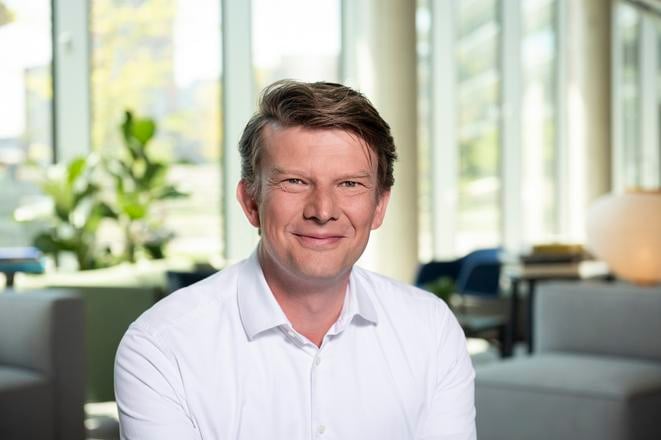 ING Hubs Slovakia head Arnout Bloys van Treslong. (source: ING Hubs Slovakia)
ING Hubs Slovakia head Arnout Bloys van Treslong. (source: ING Hubs Slovakia)
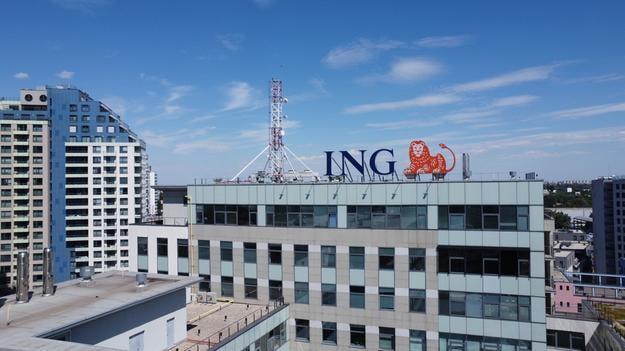 (source: ING Hubs Slovakia)
(source: ING Hubs Slovakia)
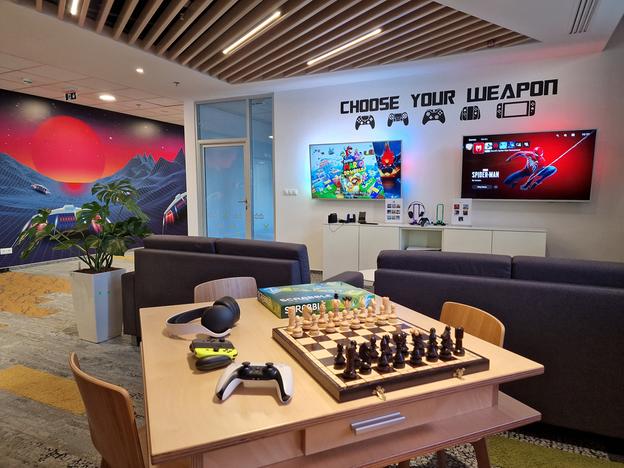 (source: ING Hubs Slovakia)
(source: ING Hubs Slovakia)
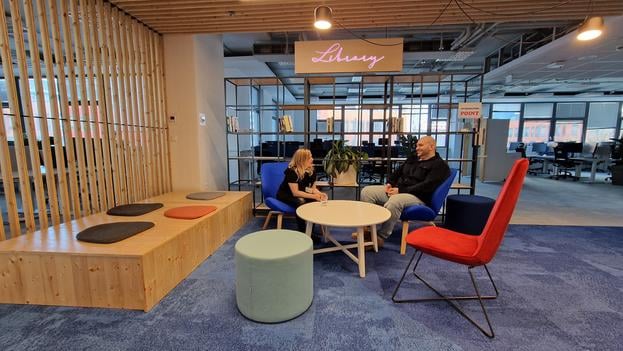 (source: ING Hubs Slovakia)
(source: ING Hubs Slovakia)
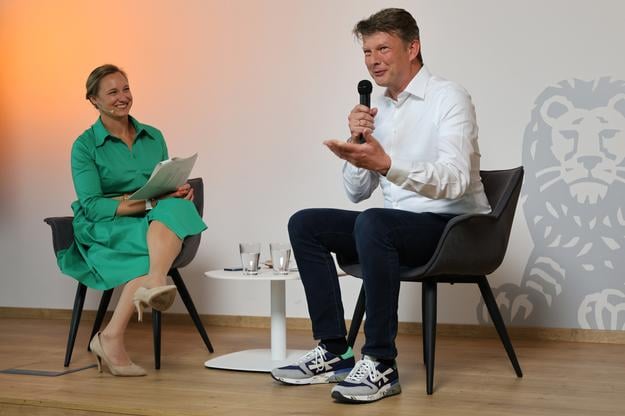 " It is almost inevitable to make mistakes if you want to grow," says ING Hubs Slovakia head Arnout Bloys van Treslong. (source: ING Hubs Slovakia)
" It is almost inevitable to make mistakes if you want to grow," says ING Hubs Slovakia head Arnout Bloys van Treslong. (source: ING Hubs Slovakia)